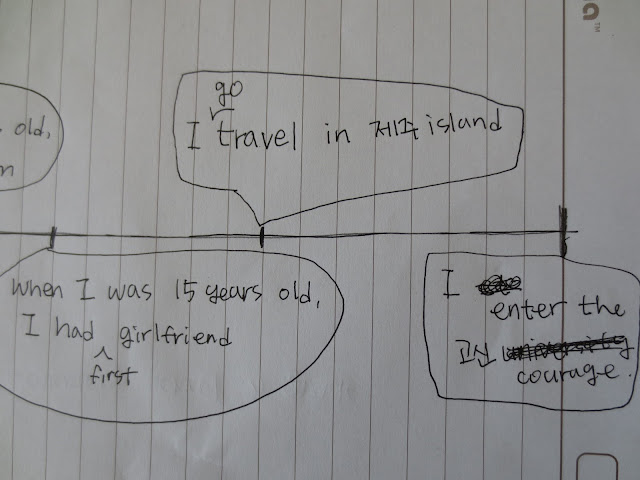Pak Jae Ick is a skinny, humorous man who reminds me
inexplicably of my college soccer coach whose name is Kim Jong Il (not related
to Kim Jong Um or his daddy). I am a great fan of Park Jae Ick partly because he
is the only Korean colleague I have who has willingly chatted with me and
partly because said college coach he resembles memorably encouraged one of our
players, “It’s okay, Ribbie. Next time you break her leg!” Sometimes I imagine
Pak Jae Ick encouraging me with those same words after I finish with my more
frustrating freshmen.
Consequently, when he recommended I tutor Keum Jin
Woo, I was “impressed” as my students like to write. They really mean something
like “eager to do something because my heart was touched,” but as far as I can
tell there’s no English translation for that. More later about how much more in
tune Koreans are with their feelings.
I walked across our campus’ dirt soccer field the
next day, found Keum Jin Woo’s office and knocked. I was greeted with a short,
small, elderly professor with a warm handshake and a friendly, “You can call me
Jin.” A squirrel-like man in the best way possible, Jin Woo abounds with well-contained
mirth and complex thoughts, communicated in a reedy wobble of a voice.
He is also a wealth of information about all sorts
of Korean culture:
“It is ancient Eastern medicine ideas. Yeomso. Yeomso . . . ah . . . you know?” I shook my head; he rifled through
a dictionary. “Goat! Yes. Ancient Eastern medicine idea. Goat good for women,
to eat. It’s a kind of seasonal food. Goat for women’s hormones. For men, chueotang.” We looked it up. “Mudfish
soup. Good for men.”
“When I was in high school, army was compulsory
subject.”
“Wait—really? What did you do in class?”
“Korean high school is three years. First year do
shooting and—” He gestured blocking a punch with his forearms. “—hand-to-hand
fighting. Second year do—” Again, a gesture and small game of charades[1]
before we figured out: “—weapons assembly. Because war with Vietnam at that
time, so . . . situation . . .”
“Was tense?” I suggested.
“Ne [yes].
The girls had to practice nursing.”
“Wow.
Fourteen-years old—were you boys scared because of . . . ?”
“No.” He chuckled—a squeaky, staccato cough-like
chuckled from his whole, tiny torso. “We thought fun!”
Jin Woo teaches in Kosin’s design department and publishes
two articles a year in Korean journals. His current research project being how
design can be used in nonprofit governmental aid-type projects in
economically-struggling countries. He likes to hike, dabbled in marathons a few
years back, and has traveled widely with his wife. She and his two daughters
live in American now; Jin Woo visits during both the winter and summer
vacations, but he turned down a professorship in America because he didn’t feel
his English was up to the task.
This week, the cost of health care came up.
Jin Woo said, “I was in Korean neighborhood in
Chicago and I saw advertisement. It said for homesick trip back to Korea
included hotel in home-town, some food, and plane back to Chicago—and! And
medical check! Because it’s so cheap here. And Koreans get homesick.”
I asked if some people came to Korea for plastic
surgery too, and Jin Woo said yes, citing a newscaster who, that very morning,
had castigated Busan for only drawing ¼ of tourists, including those coming for
health and appearance reasons. Since one of my students had flaunted her recent
epicanthoplasty, I naturally pursued the subject and asked Jin Woo if his
daughters wanted plastic surgery.
“First daughter wants—” He pointed to his teeth.
“—orthodontia,” I supplied, pointing unnecessarily
and empathetically at my own orthodontia-ed teeth.
“And second daughter wants to be taller.”
We both laughed. He is a very short little man. I
can imagine his Korean wife is also physically diminutive.
“But I—I cannot support!” he squeaked, spreading his
arms wide in an open-armed shrug.
I hope when I’m Jin Woo’s going-on-venerable age, his
shy yet exuberant chuckle is one of many memories about Korea that stays with
me.
 |
| This has even less to do with Jin Woo, but it sums up what I consider to have been a perfect Saturday morning involving sun, letters, pinterest, coffee and not getting out of bed. |
[1] I’m
pretty sure I’m a god at guessing in
charades these days. Seriously. You want me on your team at parties.































